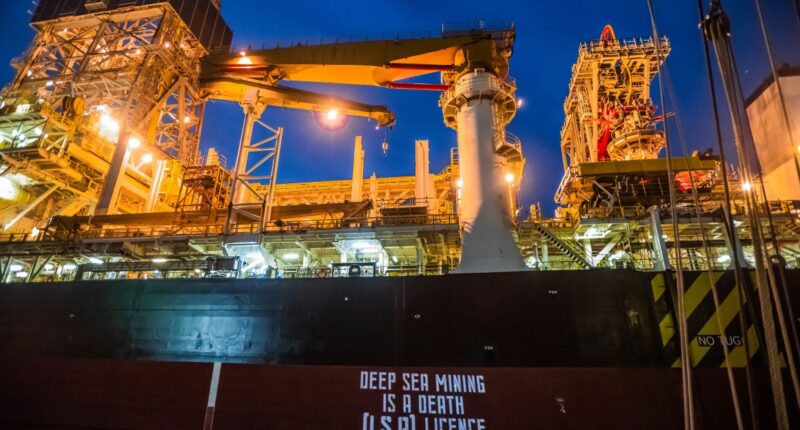Share this @internewscast.com
The Stepback is a weekly newsletter that delves into a key tech story. It includes insights on deep-sea mining and critical minerals, and is curated by Justine Calma. Subscribers receive The Stepback at 8 AM ET. You can subscribe for The Stepback here.
Covering deep-sea mining has taken a surprising turn. While I anticipated that haste and greed might jeopardize marine ecosystems — which are vital for humans too — I didn’t expect Donald Trump to disrupt global talks designed to safeguard resources deemed a “common heritage of humankind.” His actions have added an unexpected twist.
The implications of the US pushing to allow deep-sea mining for the first time are uncertain and worrisome. This large-scale endeavor has never been attempted globally, so predicting its impact is challenging. The unknowns, along with the rapid pace at which this is happening, are concerning.
The ocean still holds many secrets. While the Moon’s surface is well-mapped, the ocean floor is not. Scientists are continuously discovering new, undocumented species. There’s also current debate around “dark oxygen,” a subject of a recent study suggesting this phenomenon could reshape our understanding of life’s origins on Earth.
Without fully grasping what lies beneath or the potential consequences of disturbing it, startups, with support from President Trump, might soon venture into deep-sea mining.
Trump’s administration has shocked the international community by aggressively promoting commercial mining in the open seas. This includes evaluating a mining permit application from a Canadian firm, which, if approved, might bypass established international laws.
It’s all being done in the name of securing materials used in lithium-ion batteries. We’re all tethered to our rechargeable devices, right? And if you want more solar and wind farms and electric vehicles, you’re going to need the minerals to make the batteries for those things, the argument goes.
The prospect of deep-sea mining made headlines in 2021, after the island nation of Nauru sponsored The Metals Company (TMC) in a campaign to become the first operation to mine the deep sea for polymetallic nodules full of nickel, cobalt, manganese, and other minerals used in rechargeable batteries. Nauru triggered an obscure annex to the 1982 United Nations Convention on the Law of the Sea (UNCLOS), setting off a scramble to develop regulations — an international “mining code” — before any operation could start.
The International Seabed Authority (ISA), established by the same convention, has been wrangling with those rules ever since. There are so many tricky questions to answer, like who pays for the damage if there’s some kind of an accident that causes widespread environmental and economic fallout?
More than 160 nations — some 80 percent of the world’s countries but not the United States — have ratified the convention that governs how the ocean and its resources are used. The convention codified practices meant to limit fights that probably stem back to time immemorial over who gets to do what where. Even countries that have yet to ratify the agreement have generally followed suit. The ISA credits the convention with establishing order and minimizing territorial disputes, although power grabs over contested waters still create serious conflicts today. The ISA also asserts that UNCLOS prohibits “unilateral exploitation of resources that belong to no single [government] but to all of humanity,” whether or not a country is party to the convention.
Now, more than 30 countries are pushing for a ban or moratorium on deep-sea mining as a growing chorus of researchers and environmental advocates argue that it would be irresponsible to start mining while there’s still so little known about the deep sea. The cascading effects on marine life and the people who depend on it are hard to predict. But initial research suggests that mining equipment, sediment plumes, and noise would harm marine life — and that damage could be irreversible.
On the other hand, companies that want to start deep-sea mining say we already know what that damage can look like on land — from deforestation to community displacement and alleged child labor along mineral supply chains. Surely, they say, offshoring that resource extraction won’t be as bad.
Now, The Metals Company has found a more powerful government ally in Trump, who has been obsessing over mining as a purported way to counter China’s dominance in critical mineral supply chains. He signed an executive order in April that aimed to fast-track seabed mining in US and international waters. The action essentially amounts to saying “to hell with the international mining code, we can unilaterally authorize mining.”
In response, the ISA moved to investigate whether companies are violating contracts by trying to mine the deep sea unilaterally — which could put TMC’s existing ISA exploration permits in jeopardy (they’d need separate approvals to actually exploit resources they find). The Metals Company didn’t respond to requests for comment from The Verge.
I’m an island girl. I love looking out over the ocean and seeing no end, wondering what’s out there and marveling at how the water connects us all. I’m just hoping we don’t have to relearn that lesson the hard way if the consequences of deep-sea mining start washing ashore.
- Prospective deep-sea miners, including TMC, are eyeing a region between Hawaii and Mexico called the Clarion-Clipperton Zone, where up to 90 percent of species recently collected for study are thought to be completely new to science.
- There are a few different types of potential sources for battery minerals along the seafloor:
- Polymetallic nodules that TMC calls “batteries in a rock,” thought to be easier to pluck off the seafloor than exploiting other sources. Trump keeps one such nodule on the resolute desk, TMC chairman and CEO Gerard Barron said during a House Natural Resources Committee oversight hearing in April.
- Hydrothermal vents, which The Verge made a video about in 2019.
- Crusts rich in cobalt along underwater mountains and ridges.
- The Deep Sea Conservation Coalition argues that recycling and technological advances away from lithium-ion batteries toward potential alternatives, including lithium iron phosphate (LFP) and sodium-ion batteries, would eliminate the need for deep-sea mining.
- The Verge covered news in April about The Metals Company applying for a permit from the Trump administration to start commercially mining in international waters.
- This research paper describes the discovery of dark oxygen, which faces skepticism from some other scientists and The Metals Company that initially funded the research.
- Noise from deep-sea mining could be equivalent to or even louder than a rock concert, which could pose risks to nearby marine life, a 2022 study found.
0 Comments







